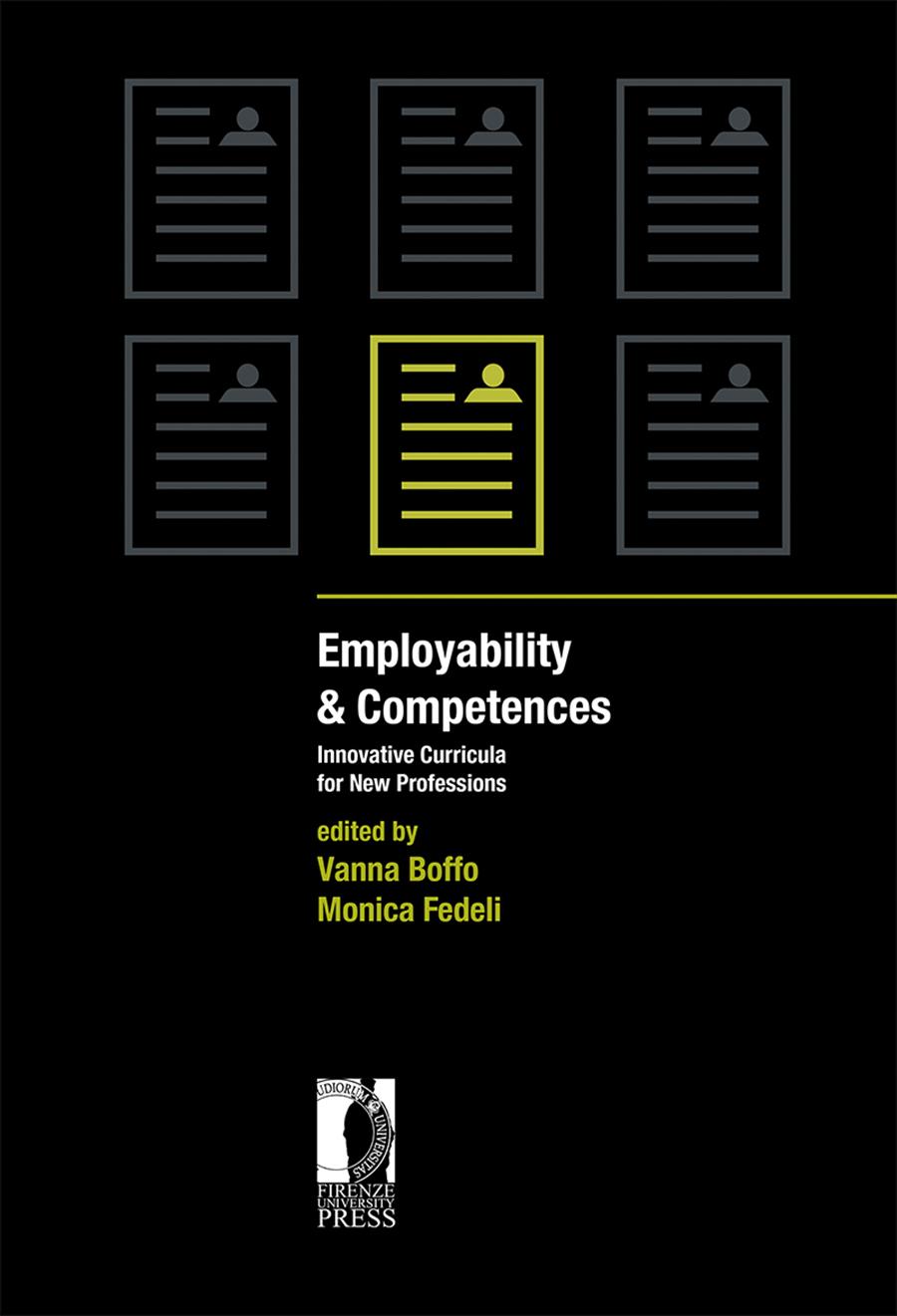- Employability & Competences
- Edited by Vanna Boffo, Monica Fedeli
Non-linear Paths in Transitions through the Labour Market
- Paolo Federighi
- © 2018 Author(s) |
- CC BY 4.0
- DOI: 10.36253/978-88-6453-672-9.20
Entering a study course and the subsequent transition to the labour market is no longer the rule. In the past, routes were linear, today transitions are non-linear. The research undertook to contribute to studying the factors that promote university students’ transition to work. Some of the research activities have been devoted to a longitudinal study where the ways Educational Science graduates manage their own professionalization strategies have been investigated. It is a cluster for which in several countries the lowest return has been estimated in relation to higher education investment. If we manage to clarify the terms of non-linear transitions paths we can succeed in understanding the types of measures to be introduced, how to relate them to processes that will professionalize students, when to activate them, and how to evaluate their impact
- Keywords:
- higher education democratisation,
- non-linear transitions,
- professionalization measures in higher education,
University of Florence, Italy - ORCID: 0000-0001-5041-7443
- Assaad R., Krafft C. and Salehi-Isfahani D. 2014, Does the type of higher education affect labor market outcomes? A comparison of Egypt and Jordan, Working Paper 826, April 2014, Giza,
- Egypt, The Economic Research Forum (ERF).
- Billett S., Thomas S., Sim C., Johnson G., Hay S. and Ryan, J. (2010), Constructing productive post-school transitions: An analysis of Australian schooling policies, «Journal of Education and Work», XXIII, 5 November 2010, 471-489.
- Boffo V. 2017, The Embedded Employability Process, in Boffo V., Fedeli M., Melacarne C., Lo Presti F. and Vianello M., Teaching and Learning for Employability: New Strategies in Higher Education, Milan-Turin, 161-165.
- Bon-Maury G., Bruneau C., Dherbécourt C., Diallo A., Flamand J., Gilles C., Trannoy A. 2016, Le coût économique des discriminations, France Stratégie, <http://www.strategie.gouv.fr/sites/strategie.gouv.fr/files/atoms/files/19-09-2016_fs_rapport_cout_economique_des_discriminations_final_web_0.pdf> (01/2018).
- Burke P., Threadgold S. and Bunn M. 201), Degrees of Class: Interrogating linear and non-linear transitions from higher education into the labour market, Paper presented at Higher Education Rising to the Challenge Balancing expectations of students, society and stakeholders, SRHE Annual Research Conference, 6-8 December 2017, Newport.
- Caza B.B. and Creary S.J. 2016, The construction of professional identity, in Wilkinson A., Hislop D. and Coupland C. (eds.), Perspectives on contemporary professional work: Challenges and experiences, Cheltenham, 259-285. Edward Elgar Publishing. [Electronic version], from Cornell University, SHA School site: <http://scholarship.sha.cornell.edu/articles/878>.
- Danieli O., Hillis A. and Luca M. 2016, How to Hire with Algorithms, «Harvard Business Review», October 17, 2016.
- Collins P.H. 2000, Black feminist thought: Knowledge, consciousness, and the politics of empowerment, Routledge, New York.
- Eraut M. and Hirsh W. 2007, The Significance of Workplace Learning for Individuals, Groups and Organisations, Oxford & Cardiff University, ESRC Centre on Skills, Knowledge and Organisational Performance, Oxford-Cardiff.
- Harrison N. 2017, Student choices under uncertainty: bounded rationality and behavioural economics, in Mountford-Zimdars A. and Harrison N. (Eds.), Access to Higher Education: Theoretical Perspectives and Contemporary Challenges, Routledge, London.
- Harvey L. 2003, Transitions from higher education to work, Centre for Research and Evaluation, Sheffield Hallam University.
- Hoffman M., Kahn L.B. and Li D. 2015, Discretion in Hiring, Harvard Business School, Cambridge.
- Hiss W., Doria K, 2011, Defining Promise: Optional Standardized Testing Policies in American College and University Admissions, Bates College, Lewiston, Maine.
- Jääskelä P. and Nissilä P. 2015, Identifying Themes for Research-Based Development of Pedagogy and Guidance in Higher Education, in «Scandinavian Journal of Educational Research», LIX (1), 24-41.
- Machin S. and McNally S. 2007, Tertiary Education Systems and Labour Markets, «Thematic Review of Tertiary Education», OECD, Paris.
- Minchington B. 2010, The employer brand manager’s handbook, Collective Learning, Torrensville.
- Nijhof W.J. and Nieuwenhuis L.F.M. 2008, The Learning Potential of the Workplace, Sense Publishers, Rotterdam-Taipei.
- OECD 2013, Education Indicators in Focus: How is International Student Mobility Shaping Up, OECD Publishing, Paris.
- OECD 2017, In-Depth Analysis of the Labour Market Relevance and Outcomes of Higher Education Systems: Analytical Framework and Country Practices Report, Enhancing Higher Education System Performance, OECD, Paris.
- Reich Y. 1991, The Work of Nations: Preparing Ourselves for 21st Century Capitalism, New York, Knopf Publishing.
- Torlone F. 2017, The Transitions of Young Adults to Define Individual Pathways of Professional Insertion, in Boffo, V. Fedeli M., Melacarne C., Lo Presti F. and Vianello M., Teaching and Learning for Employability: New Strategies in Higher Education, Milan-Turin, 175-190.
- Vicari S. 2008, Conoscenza e impresa, «Sinergie», 76, 43-66.
- Young B. 2011, Ladder vs Lateral career paths, «Career Development Toolkit», hrmcareerdevelopment.blogspot.it (01/2018).
Chapter Information
Chapter Title
Non-linear Paths in Transitions through the Labour Market
Authors
Paolo Federighi
Language
English
DOI
10.36253/978-88-6453-672-9.20
Peer Reviewed
Publication Year
2018
Copyright Information
© 2018 Author(s)
Content License
Metadata License
Bibliographic Information
Book Title
Employability & Competences
Book Subtitle
Innovative Curricula for New Professions
Editors
Vanna Boffo, Monica Fedeli
Peer Reviewed
Number of Pages
510
Publication Year
2018
Copyright Information
© 2018 Author(s)
Content License
Metadata License
Publisher Name
Firenze University Press
DOI
10.36253/978-88-6453-672-9
ISBN Print
978-88-6453-671-2
eISBN (pdf)
978-88-6453-672-9
eISBN (xml)
978-88-9273-119-6
Series Title
Studies on Adult Learning and Education
Series ISSN
2704-596X
Series E-ISSN
2704-5781
